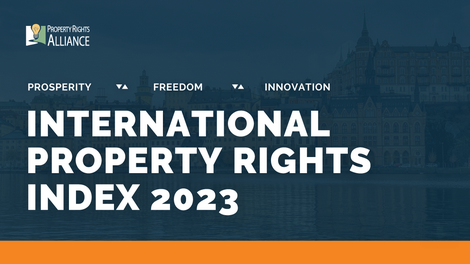September 27th, 2023
The Property Rights Alliance Announces Release of the
2023 International Property Rights Index
Washington, D.C. – The Property Rights Alliance (PRA) released the 2023 International Property Rights Index, the only global, comparative index that ranks the strength of property rights, both physical and intellectual, as well as the legal and political environments that contain them. PRA worked with 131 think tanks in 73 countries to emphasize that property rights are, in fact, essential for a more prosperous, and free society.
The IPRI Global Launch will be on September 27th, 2023, in Stockholm (Sweden) in partnership with Swedish magazine Svensk Tidskrift.
The global economy has experienced a downturn over the past four years, and many countries are at risk of recession. To help move towards a stable recovery, it is essential to reaffirm physical and intellectual property rights. Robust legal and political frameworks for property rights not only protect the intangible and tangible assets of inventors but also incentivize creators to produce goods that are better and safer than before. Such frameworks also secure investors to finance creations without the guarantee of return, thereby promoting innovation and economic growth.
High-income countries impose the strongest protections for physical and intellectual property while lower-middle income countries impose several restrictions on foreign ownership of intellectual property and investments. The success of a nation’s economy heavily relies on these essential protections.
The IPRI measures direct and indirect trade barriers imposed by 125 countries affecting 93.4% of the world’s people and 97.5% of global GDP. The Index shows that 83.3% of the global population lives in 81 countries with an IPRI between 2.9 and 5.7. Little less than half of the sample population (47.3%) lives in 27 countries with a middle score of this index, [4.8 – 5.7]. The Index finds countries with strong property rights expressed through strong legal protections, and intellectual and physical property rights. As the Nobel Laureate Friedrich von Hayek stated: “The system of private property is the most important guaranty of freedom”.
Executive Director of the Property Rights Alliance and Editor of the Index, Lorenzo Montanari, commented on the release, “Every year IPRI highlights the key role played by property rights not only in keeping an economic system fair and transparent but also in representing the backbone of any free market economy. Property rights are one of the most important pillars of a free society and human rights, as stated in Article 17 of the UN Universal Declaration of Human Rights. The 2023 Index will be an important tool for policymakers and business communities to understand how the three main components of the property rights ecosystem (Legal and Political Environment, Physical Property Rights, and Intellectual Property Rights) interact to attract investment and nurture healthy institutions.”
Key Findings
This assertion of property rights is now taking place. The International Property Rights Index (IPRI) score has declined over the past four years, but there is now a slight reversal of trends. The average global IPRI score in this year’s Index is 5.21, which is only a .37% increase since last year. Intellectual Property Rights (IPR) is the only component that has increased, climbing by 2% since last year.
However, the other two measured components, Legal and Political Environment (LP) and Physical Property Rights (PPR), have continued to drop. The LP is the weakest component, falling by 0.4% to a score of 5.06, while the PPR continues to fall, dropping by 0.76% to a score of 5.23.
The Property Rights Alliance today released the 2023 International Property Rights Index (IPRI). Finland (8.1), Singapore (8.0), Netherlands (7.9), Denmark (7.8), and New Zealand (7.8) are the top five countries which scored the highest on the IPRI scale. While Venezuela (1.9), Yemen (2.4), Haiti (2.7), the Congo (3.1), and Chad (3.1) ranked the worst for defending property rights.
The IPRI measures direct and indirect trade barriers imposed by 125 countries affecting 93.4% of the world’s people and 97.5% of global GDP. The Index shows that 83.3% of the global population lives in 81 countries with an IPRI between 2.9 and 5.7. Little less than half of the sample population (47.3%) lives in 27 countries with a middle score of this index, [4.8 – 5.7]. The Index finds countries with strong property rights expressed through strong legal protections, and intellectual and physical property rights. As the Nobel Laureate Friedrich von Hayek stated: “The system of private property is the most important guaranty of freedom”.
The IPRI in its 17th edition also includes nine case studies from our partnering think tanks:
- “Analyzing the Impact of Mandatory Licensing on Intellectual Property Rights in Colombia.” By Andrea Calle y Alba Isabel García, Carlos Augusto Chacón, Instituto de Ciencia Política Hernán Echavarría Olózaga, Colombia.
- “The Importance of IP Protection for Belgian Biotech Company, Argenx.” By Pieter Cleppe, Brussels Report, Belgium.
- “Current Situation on Women’s Land Rights in Tanzania”, By Dr Samwel Alananga and Evans Exaud, Founder & Executive Director, Liberty Sparks, Tanzania.
- “Property Rights, Regional Trade, and Prosperity: The Case of Mexico.” By Dr. Roberto Salinas-Leon, Center for Latin America-Atlas Network, Mexico.
- “Assessing The State Of Property Rights Protections In Canada” By Joseph Quesnel, Senior Research Associate for the Frontier Centre for Public Policy, Canada.
- “Property Rights and Forest Change: Examining Cross-Country Data And Existing Literature” By Shawn Regan, Vice President of Research, Property and Environment Research Center, USA.
- “The Ballad Of Property Registration In Egypt” By Mohamed M. Farid, Cofounder of the Liberal Club of Cairo, Egypt.
- Property Rights In Bolivia By Leonardo Siles Oporto and Jorge Velarde-Rosso, Libera, Bolivia.
- Navigating Challenges In Brazil’s Intellectual Property Landscape By Prof. Vladimir Fernandes Maciel, Centro Mackenzie de Liberdade Econômica, Brazil.
The executive summary of the International Property Rights Index can be found here: ipri23_execsummary and the full Index can be found here: ipri23_fullreport.
Contact: Lorenzo Montanari
Email: lmontanari@propertyrightsalliance.org



